Note: new book reviews will be added to the top of this page, in order to save repeat visitors from having to scroll down an increasingly longer page each time. Enjoy!
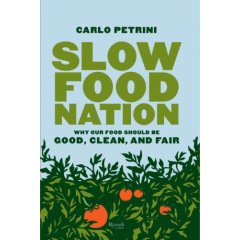 Slow Food Nation
Slow Food Nation
by Carlo Petrini
tags: know your food, simple living
The Slow Food movement began in the 1980’s, long predating The 100 Mile Diet, or The Omnivore’s Dilemma. Perhaps that is why I did not find this book a very compelling read. The author spends a great deal of time trying to define the word “gastronome” and the principles of the Slow Food movement, which are that food should be Good, Clean, and Fair. I enjoyed the Diary stories scattered throughout the book, but found most of it dry reading. The points the author was making are addressed in far more interesting and addictive reads, like Animal, Vegetable, Miracle or In Defense of Food for example. The author does touch down on the relationship between knowing your food and slowing down to live a simpler life, thus tying together two of my current favorite passions. But it’s not the sort of book you stay up too late reading, IMHO.
The World Without Us
by Alan Weisman
tags: sustainable living, being green
At first I wondered about this book. It is based on the question as to what would happen to our world should we humans all up and vacate the planet one day. The first chapter described the disintegration of the modern North American dwelling and I wondered just how interesting a few hundred pages of similar descriptions was going to be. But the author cleverly uses this question to discuss a whole range of interesting facts and issues relating to how we are impacting the Earth now. For example, the demilitarized zone between North and South Korea appears to have become an unintentional wildlife refuge; with no humans setting foot in the area populations of cranes and other endangered species cling to survival. We also learn about the history of certain places, and some frightening stories about what we do with nuclear waste. Not the page-turner that some other books on this list are, but a nice “snacking” book filled with interesting tidbits.
 Affluenza
Affluenza
by John de Graaf, David Wann, and Thomas H. Naylor
tags: consumerism, simple living
This is an excellent read. The book focuses on our society’s obsession with excess, and how the resulting drive to spend more than we earn has lead to rising consumer debt and bankruptcy rates. This book really drove home to me the insanity of “shopping as a hobby”, using credit cards to purchase things we otherwise couldn’t afford, and the underlying manipulative messages of advertising and marketing that bombard us everywhere we go. In awareness I found a sense of strength that I could overcome the “social disease” of Affluenza.
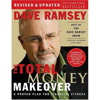
The Total Money Makeover
by Dave Ramsey
tags: money matters
This book is a must-read for anybody carrying credit card debt or other high-interest debt. Dave’s step-by-step plan is a sound and successful way to get finances under control, bring oneself out from under the weight of debt, and how to handle your money once it is truly all yours again. While our family doesn’t have high-interest debt I read it anyways as a motivation to keep our spending down and continue to use our credit responsibly. Even if you don’t have debt it’s a very inspiring read.
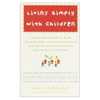 Living Simply with Children
Living Simply with Children
by Marie Sherlock
tags: simple living
I confess I didn’t make it through this book, though not because it was poorly written. Mostly it was “preaching to the choir” and for me, personally, I found no new information here. We got rid of the TV years ago, my kids aren’t in school and peer pressure is so far not an issue for us. I am already committed to living simply. However, if you are new to the concept and have children, this book might be of use.
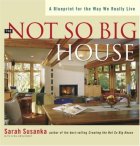 The Not So Big House
The Not So Big House
by Sarah Susanka
tags: the dream, simple living
This book has lots of lovely photos of cozy houses with well-designed and well-utilized spaces. The author speaks in favour of smaller homes, trading quantity of space for quality, and thinking outside the box to utilize space in our homes in different ways. While many of the homes she features would be expensive to build, and she doesn’t speak to living simply in terms of finances or not wanting so much “stuff”, there are still many good lessons to be learned. Ideally we’d like to build our own home when we move and this book gave me several ideas on how we could simplify the plans and lower the costs, if we choose to go this route.
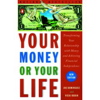
Your Money or Your Life
by Joe Domiguez and Vicki Robin
tags: money matters, simple living
This book was a big disappointment to me. I found the language unnecessarily fluffy, they used too much “New Age Speak”. It alienated even me, who is generally very comfortable with this sort of language. I found they were also overly complex when trying to get a point across. They spend too much time and too many pages getting to stuff that Dave Ramsey (see above) was able to say simply and in a handful of words. They sounded as though they were sharing some huge secret when they suggested that the money you spend commuting, eating out, and buying/cleaning professional clothes when you have a full time job takes away from your true net income. What a revelation (eyes rolling)! I also found that the meat of the book was missing, though perhaps I misunderstood the point. I was waiting to find out how to live simply, how to save money so you can retire early or obtain other goals. The message seemed to be that once you realized you didn’t need as much as you had, or that you didn’t need to work as much as you did, then suddenly you get wealthy. They put it in terms of the Universe providing, like “just quit that job, work half the hours, and you’ll get richer every year” type thing. They go from downsizing your job to being independently wealthy in one step and then it’s all about how to get your wealth to earn you money. Not too helpful.
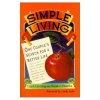
Simple Living: One Couple’s Search for a Better Life
by Frank Levering and Wanda Urbanska
tags: simple living, going green, consumerism
I loved this book. I read it cover to cover in less than 36 hours. It’s the true story of Frank and Wanda, who leave their Hollywood lifestyle in Los Angeles to run the family orchard in rural Virginia. Their story resonates with me a great deal, as I am wishing to embark on a similar journey. The story introduces all the concepts of Simple Living in the experiences and adventures of Frank and Wanda, which makes for an enjoyable read. We watch as they change and evolve, moving ever more closely to their core values (which they come to know better along the way) and as they ponder how to live a life that is true to those values. They are honest about the contradictions and hypocrisy inherent to choosing Simple Living in a part of the world that values excess. They struggle with finding the right balance between reality and idealism. It’s an honest look at what Simple Living really looks like, and I highly recommend this book.
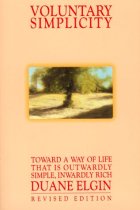 Voluntary Simplicity: toward a way of life that is outwardly simple, inwardly rich.
Voluntary Simplicity: toward a way of life that is outwardly simple, inwardly rich.
by Duane Elgin
tags: simple living, going green
This book was first printed in 1981 and was arguably one of the earliest treatises on Simple Living. The book defines and discusses various philosophies and aspects of living simply. Importantly, he distinguishes between simplicity and poverty: “Poverty is involuntary and debilitating, whereas simplicity is voluntary and enabling.” The stated reasons for choosing the simple life are focused largely on the health of society and that of the planet, but also on development on the Self. There is an interesting section at the end about the life cycle of civilizations, as studied by the author and other scientists specializing in the behaviour of social systems. Overall, this was an interesting read and a good affirmation of what Simple Living is all about. It was, however, a more dry read in comparison to the book above (Frank Levering and Wanda Urbanska’s story) though I suspect had I not read them in that order, this perhaps would not have held true. I do recommend this book to anyone who wants to know what Simple Living is all about.
Animal, Vegetable, Miracle: a year of food life
by Barbara Kingsolver
tags: simple living, gardening, being green, know your food
I enjoyed every minute of this book. It’s another story of a family who takes up permanent residence on the family “summer farm” and vows to spend a year eating only local food. As they delve headlong into gardening, raising their own chicken and turkeys, and contemplating seasonal eating they touch upon many issues relevant to today’s concerns about industrial food production and its effects on our health, diet, and the local economy. The book also contains mouth-watering recipes and meal plans for each month of the year based on seasonal availability. I was also inspired by the food preservation techniques they used: canning, drying, pickling, and utilizing their root cellar. In short, a fabulous read for anybody interested in where their food comes from, and the collective knowledge lost by modern food production and distribution methods.
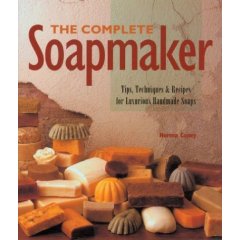 The Complete Soapmaker
The Complete Soapmaker
by Norma Coney
tags: simple living, homemaking, being green
I’ve recently become interested in soapmaking. Books on soapmaking come in two varieties: those that show you how to make your own basic soap from scratch, and those that teach you how to use already-made soaps to create custom soap (the so-called “melt and pour” technique). This book is of the former variety, and then allows you to use your basic soaps to create various melt-and-pour custom soaps. I found it very detailed, clear, and easy to read. I was particularly interested in the tidbits of soap-making history sprinkled throughout the book. Recipes for basic soaps such as Homesteader’s Soap and Olive Oil Castille Soap bring to mind a sense of the timelessness of this art. I was interested to learn about what soap is, and the fact that most commercial “soaps” sold today are in fact petroleum-based detergents and not true soap. If you are thinking about making your own soap, or even just curious about soapmaking and soap itself, I recommend it.
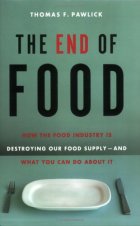 The End of Food: how the food industry is destroying our food supply and what you can do about it
The End of Food: how the food industry is destroying our food supply and what you can do about it
by Thomas F. Pawlick
tags: know your food
The tone of this book tends toward alarmist and there is use of hyperbole scattered throughout. But besides that minor complaint, there is a great deal of very useful and important information in here. For example, statistics kept for the last 50 years or more demonstrate that the nutritional value of conventionally grown food is far lower than that of organically, sustainably grown food. The reasons are becoming obvious to me when I consider such things as what goes into making a vegetable. This book is worth the read just for the scope of information it provides, but I could have done without the chicken little tone in parts.
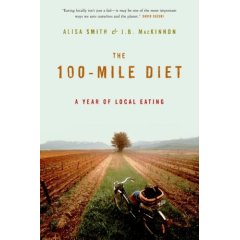 The 100 Mile Diet
The 100 Mile Diet
by Alisa Smith and J.B. MacKinnon
tags: know your food
I loved this book, in no small part because I live within the 100 mile region the authors used to source their food. This is the story of the founders of the 100 Mile Diet, sparking a movement toward local eating that is growing every year. Alisa and James, concerned about the fact that the average North American meal has travelled 1500 miles between pasture and plate, decide to spend a year eating foods grown within 100 miles of their home in Vancouver. Besides the interesting tidbits about local eating, they provide a fascinating look at the history of the region. Hundreds of years ago local native populations feasted on a cornucopia of foods that were provided by Nature. They sample local fares of other regions such as Minnesota and Mexico, while travelling for work. It’s a true testament to what we have lost, and a call to arms to bring some of that knowledge back. A must-read for anyone interested in knowing their food and eating locally.
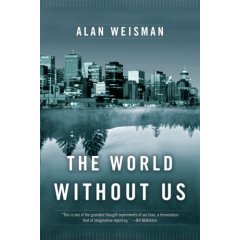
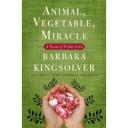
Posted by Bookworm Challenge « Rural Aspirations on April 25, 2008 at 8:36 am
[…] Book List […]
Posted by Sarah on May 4, 2008 at 4:53 pm
YouTube had some good videos on Affluenza, don’t know if you’ve seen them.
Looks like I have some more reading to do!!
Posted by Book Reviews « Rural Aspirations on May 18, 2008 at 7:42 pm
[…] Book List […]
Posted by The Future of Farming? « Rural Aspirations on July 17, 2008 at 8:30 am
[…] Book List […]
Posted by homeschool10x on November 20, 2008 at 1:29 am
Hi, I just spent a pleasant hour reading your blog, sortof getting to know you. I started with my “day job” hat on, looking for connections and links for my homeschool online biz. After awhile, I drifted into another place and remembered my favorite of the blogs that I keep up. One in which I discuss my actual reading lists and interests.
thanks,
Posted by Nichole on April 3, 2011 at 8:50 pm
Just signing up. 🙂